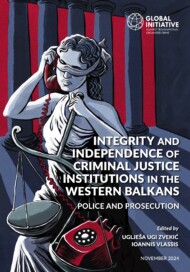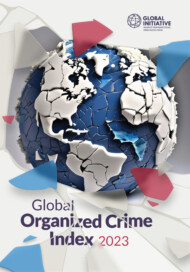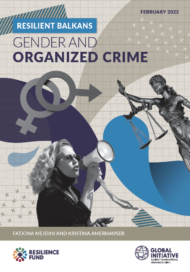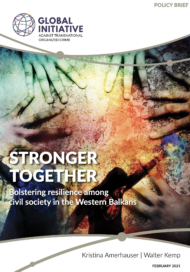Event Details
Click here to watch the live streaming
Webinar ID: 885 1868 3586
Posted on 14 Mar 2025
On 10 and 11 March 2025, the Global Initiative Against Transnational Organized Crime (GI-TOC) and the Ministry of Justice of Slovenia organized a conference in Ljubljana to explore regional strategies for strengthening anti-corruption efforts in the Western Balkans. The meeting, entitled ‘Towards the EU: Enhancing integrity and independence of criminal justice in the Western Balkans’, attracted more than 90 participants from the region, including justice ministers; senior criminal justice officials from the police, prosecution and judiciary; heads of national anti-corruption agencies; and representatives from civil society, academia, and relevant regional and international institutions (including Eurojust, Europol, the European Public Prosecutor’s Office, the International Anti-Corruption Academy, the Regional Anti-Corruption Initiative, and the United Nations Office on Drugs and Crime). The conference, supported by the United Kingdom, built on previous regional anti-corruption meetings co-hosted by the GI-TOC in Šibenik, Croatia in 2022 and Tirana, Albania in 2024.
The primary focus of the meeting was strengthening the integrity and independence of criminal justice systems. Participants were briefed on the main observations and recommendations of a GI-TOC report on this topic released in November 2024, focusing particularly on police and prosecution. A second report on the judiciary and anti-corruption bodies is scheduled to be published in mid-2025.
In the opening session, ministers of justice from the six Western Balkan countries as well as Croatia and Slovenia underlined the need for leadership and political will to foster a culture of integrity in the region. They stressed that politicians and senior officials in public administration and the private sector must lead by example by ensuring transparency, enforcing accountability and upholding ethical standards in decision-making. Slovenian Justice Minister Andreja Katic emphasized that such steps are vital for increasing citizens’ trust in decision-makers, authorities and public institutions.
While conference focused on strengthening anti-corruption measures in the context of EU accession, several speakers pointed out the wider benefits of addressing corruption. ‘Strengthening integrity is not a box to be ticked to get into the EU,’ said Mark Shaw, Director of the GI-TOC. ‘It is in the self-interest of well-governed states, donors who support reforms in the region and obviously the people.’
Mark Williams, Head of the International Serious and Organised Crime Unit at the UK Home Office, noted that ‘the Western Balkans is of long-standing importance to the UK and [the UK is] committed to supporting the countries in the region’. To illustrate this pledge of support, he informed participants that the UK will host the next meeting of the Berlin Process and that Dame Karen Pierce has been appointed special envoy to the Western Balkans.
Marta Kos, the EU Commissioner for Enlargement who is from Slovenia, delivered a pre-recorded video message, observing: ‘The larger European Union is only stronger if it is united, and unity comes from being grounded in the same values and interests, this is why we are holding you – the institutions fighting organized crime and corruption, the judiciary, anti-corruption bodies, the police and prosecution offices – to the highest standard, because we need you to be the guarantors of the rule of law and of the fundamental freedoms of your citizens.’
The conference emphasized that corruption is a key enabler of organized crime and that the two can merge in what has been referred to as ‘organized corruption’.
A recurrent theme throughout the conference was the importance of anti-corruption education – starting from an early age and extending to public administration – and raising public awareness about the harms caused by corruption.
Fatjona Mejdini, Director of the South Eastern Europe Observatory of the GI-TOC underlined the role of civil society not only in terms of education but also in anti-corruption prevention and monitoring. Another main theme was the need for cooperation: within societies, throughout the region, and between Western Balkan countries and jurisdictions that are destinations for illicit financial flows from the region.
One panel focused on strengthening gender perspectives in the fight against corruption and enhancing the role of women in criminal justice systems. It was noted that women are under-represented in senior criminal justice positions in most countries of the region. Participants were encouraged to work harder to remove both cultural and structural barriers to the advancement of women in the justice sector and to create an environment that supports and promotes women’s leadership and participation at all levels.
A separate session was dedicated to discussing how to reduce the vulnerability of ports to corruption and organized crime. The panel drew on observations and recommendations made in the GI-TOC’s 2022 report Portholes: Exploring the maritime Balkan routes.
During the conference, participants agreed that the fight against corruption requires political leadership, cross-border cooperation, the involvement of civil society and greater gender equality in judicial institutions. The meeting underlined that anti-corruption measures are not merely EU accession requirements but fundamental elements of good governance that directly benefit citizens. The conference concluded with the adoption of the Ljubljana Conclusions, reinforcing regional commitment to combat corruption and organized crime through collaborative strategies and systemic reforms.



